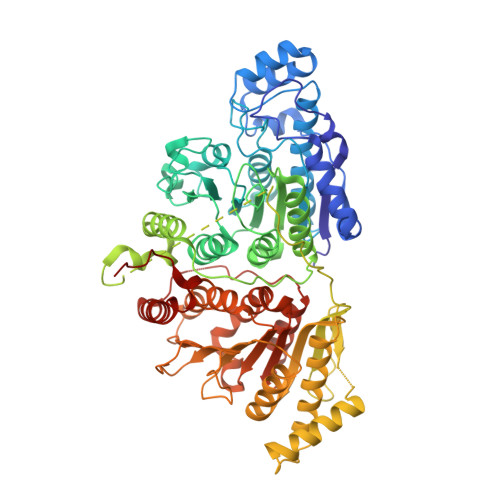Aza-SAHA Derivatives Are Selective Histone Deacetylase 10 Chemical Probes That Inhibit Polyamine Deacetylation and Phenocopy HDAC10 Knockout.
Steimbach, R.R., Herbst-Gervasoni, C.J., Lechner, S., Stewart, T.M., Klinke, G., Ridinger, J., Geraldy, M.N.E., Tihanyi, G., Foley, J.R., Uhrig, U., Kuster, B., Poschet, G., Casero Jr., R.A., Medard, G., Oehme, I., Christianson, D.W., Gunkel, N., Miller, A.K.(2022) J Am Chem Soc 144: 18861-18875
- PubMed: 36200994
- DOI: https://doi.org/10.1021/jacs.2c05030
- Primary Citation of Related Structures:
7SGG, 7SGI, 7SGJ, 7SGK - PubMed Abstract:
We report the first well-characterized selective chemical probe for histone deacetylase 10 (HDAC10) with unprecedented selectivity over other HDAC isozymes. HDAC10 deacetylates polyamines and has a distinct substrate specificity, making it unique among the 11 zinc-dependent HDAC hydrolases. Taking inspiration from HDAC10 polyamine substrates, we systematically inserted an amino group ("aza-scan") into the hexyl linker moiety of the approved drug Vorinostat (SAHA). This one-atom replacement (C→N) transformed SAHA from an unselective pan-HDAC inhibitor into a specific HDAC10 inhibitor. Optimization of the aza-SAHA structure yielded the HDAC10 chemical probe DKFZ-748 , with potency and selectivity demonstrated by cellular and biochemical target engagement, as well as thermal shift assays. Cocrystal structures of our aza-SAHA derivatives with HDAC10 provide a structural rationale for potency, and chemoproteomic profiling confirmed exquisite cellular HDAC10-selectivity of DKFZ-748 across the target landscape of HDAC drugs. Treatment of cells with DKFZ-748 , followed by quantification of selected polyamines, validated for the first time the suspected cellular function of HDAC10 as a polyamine deacetylase. Finally, in a polyamine-limiting in vitro tumor model, DKFZ-748 showed dose-dependent growth inhibition of HeLa cells. We expect DKFZ-748 and related probes to enable further studies on the enigmatic biology of HDAC10 and acetylated polyamines in both physiological and pathological settings.
Organizational Affiliation:
Cancer Drug Development, German Cancer Research Center (DKFZ), 69120 Heidelberg, Germany.




















